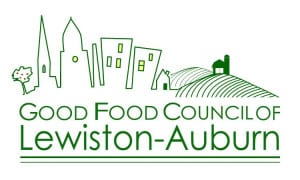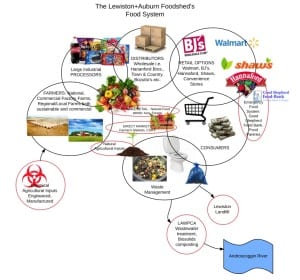By Karen Bolduc, Good Food Council Member
AUBURN – When something is out of sight, it is often out of mind. But does this mean it doesn’t exist, or need to be managed, or thought about? All of the daily “stuff” in our lives – a chair, a cell phone, a blanket, a banana peel – will decompose eventually and become waste that needs to be managed. A lot of our waste management systems in place today are relics from a time when we thought space was endless and banana peels represented only a problem – one that needed burying. However, we are now beginning to piece together problems with these old ways. Additionally, we know that free, sustainably produced fertilizer to enrich our agricultural crops and provide balanced, healthful food for our communities, doesn’t have to be chemically produced and bought it at expense to farmer and environment. Instead, we can take the organic waste materials of our everyday lives (leaves, grass, food scraps, etc.) and create gorgeous, black dirt called compost that is the most basic and useful soil fertility amendment needed to grow good crops. We can’t just landfill and burn our wastes forever – We’ll run out of space and clean air! And why would we when the compost process is so easy and simple?
When the Dempsey Challenge blew into town with its usual fervor and gusto this past September, they brought with them a commitment to this very type of sustainable waste management, by recruiting an incredibly dedicated group of local volunteers, who formed a “Green Team.” This team ensured that the climactic Dempsey Challenge lobster feed resulted in clean, sorted compostable waste separate from the normal incinerator-bound waste. They worked with South Auburn Organic Farm to trailer these lobster shells, corn cobs, paper napkins, and cellulose-based cups and trash bags to the farm’s composting site where they were mixed with fall leaves, hay and straw, and a bit of finished compost to activate the composting process. By this time next year, with a little turning by the farm tractor and temperature monitoring, this waste will become fertilizer for the farm’s new season of crops. Now isn’t that smart? Thanks Patrick, and the Dempsey Challenge Green Team!
Next time you prepare (or have someone else prepare for you) a meal which yields some choppings, scraps, peels, crumbs, pits, piths, or leftover bits you don’t end up eating (perhaps every meal?), consider that a meal isn’t really “gone” after you eat it just because you can’t see it – there is a whole system invented to deal with the attendant waste products, and we need to think about and manage that system responsibly for future generations. Take a page out of the Dempsey Challenge’s book and find ways to compost at home (PDF), or look into ways to get curbside composting in your city.

